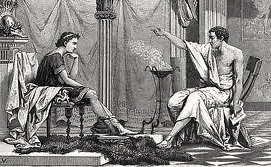When was the last time you read Homer in the original Greek? How about Latin? Can you speak Latin? Read it? Me neither.
But it hasn’t been that long since, if you were highborn, tutors taught you those ancient languages as an essential part of your education as a Renaissance Man (not so much emphasis on Renaissance Women in those days). Men like Thomas Jefferson were raised this way. As a matter of birth and privilege, they took their places as our thinkers and policy makers, the heirs to Aristotle and Plato.
Not many pursuing a classical liberal education today have a place waiting for them at the table of power. They are educated to be founding fathers, but they end up waiting tables or signing on as management trainees in businesses they know nothing about except that they offer health-care coverage.
I saw a program on public television recently about “immersive learning.” Kids in middle school were building robots to compete with each other. Students in high-school statistics classes were designing and conducting election exit polls and analyzing the responses. No one was drifting off to sleep at her desk.
The program made me think of my son Nicholas’s experience with robotics and musical theatre, both starting in middle school. Each was deep immersion. Each inspired enduring passion. Today, a junior in college, Nick is studying computer science and singing in the men’s glee club. On the side (I hope), he’s programming for a Silicon Valley start-up.
In college, I thought I wanted a broad liberal arts education, although I had no idea what that meant, not really. That was what I had been taught would make me a Renaissance Man, which sounded like a cool thing to be (and probably was, during the Renaissance). My course of study as an English major improved my understanding of how people behave in novels and plays but did nothing for my ability to affect any living person’s behavior. It was enervatingly passive. I had no idea what my place in the world might be. I could not see myself making a difference to anyone about anything.
In law school, I acquired a trade. I didn’t cure cancer, but it was a heck of a lot more satisfying than sitting around philosophizing impotently. High school and college were long paths to the law, longer than they needed to be. Law (like medicine and engineering, for instance), is its own little universe of rules and logic. Maybe if I'd gotten turned onto law in middle school or high school, I could have avoided all that listless wandering about in college, wondering what it was all about.
Here’s what I tell my children (as I remember it; they may say something different): Find something you love and do it. Actively look for it. Don’t wait for it to fall into your lap while you check off curriculum requirements. The flush of academic achievement is like sex: it’s a lot of fun, but it will not to sustain you if you don’t really care about what (or whom) you’re studying. Bend your education to your passion, not the other way around. Work hard at what you love. Get good at it. Do something no one else can do.

Great observations. It's time we quit looking down our nose at very honorable trades. College isn't for everybody....let me tell ya!
ReplyDeleteDavid